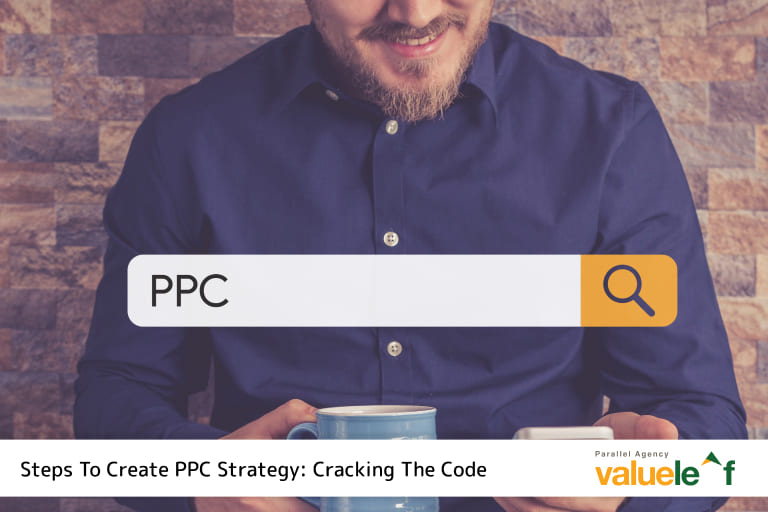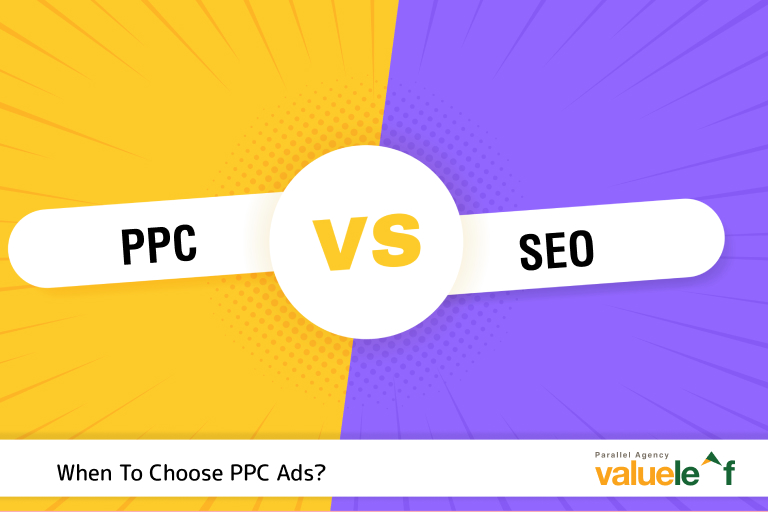You’re a digital marketer, and a client has reached out to you for marketing assistance around the launch of a new product or service. They are ready to invest with a clearly defined target audience. Considering the need for immediate results, you have decided to go with PPC ads. Pay-per-click (PPC) advertising is one of the best digital marketing strategies where advertisers pay a fee each time your ad gets clicked. It helps drive traffic to your website, and conversions. In this blog, let’s focus on the importance and significance of PPC campaigns, and the steps to create a PPC strategy.
First, What is PPC & How it Works?
PPC stands for Pay-per-click is an online advertising model where advertisers pay each time a user clicks one of their ads. Here, advertisers bid on certain keywords and based on it, the ads are placed on search engines or websites. These PPC campaigns appear when users search for the keywords.
Paid search advertising is a valuable marketing tool for businesses of all sizes, including small businesses and startups. It avoids scattering of ads, allowing it to reach their target audience quickly and efficiently. Also, the advertiser is charged only when a user clicks on their ad, making it a cost-effective way to drive traffic to a website.
Steps To Create PPC Strategy
Before investing in advertisements, it is important to develop a carefully designed PPC campaign. The following points focus on the steps to create a PPC strategy.
1. Set Clear Goals & Budget
To define your campaign objectives, know what you want to achieve with your PPC advertising. Is it to increase brand awareness, generate leads, or drive sales? Having well-defined goals will shape your entire PPC strategy. Simultaneously, set a realistic budget that aligns with your goals.
2. Do thorough keyword research
Discover high-performing keywords that are relevant to your business and competitors. To identify the keywords make use of keyword research tools like Google Keyword Planner.
3. Know your audience
Understanding your target audience is important to create an effective PPC campaign. Learn your audience’s demographics, interests, and online behaviour through in-depth research and customise ads for maximum relevance.
4. Create compelling ads
Craft engaging ads that talk directly to your audience, highlighting the unique selling point of your product or service. Use clear and simple language with a strong call to action, like “Visit our website” or “Learn more.” Ensure to keep your ads concise and relevant to the keywords you are targeting.
5. Utilise ad extensions
Enhance your ads with additional information using ad extensions like links and callouts. It makes your ads more appealing and provides useful details to your potential customers, improving overall performance.
6. Choose your bidding strategy
Select a bidding strategy that fits your goals. For more control over your bids, use manual CPC (Cost Per Click) and automatic bidding for optimising ROI. Also, regularly monitor bids for performance and make necessary adjustments.
7. Monitor, Analyse & Modify your campaigns
Use analytics tools to monitor the effectiveness of your PPC campaign. Track the conversion rate, cost per conversion, and click-through rate (CTR). With this information, identify areas that require improvements. and modify your strategy to keep your campaign profitable and successful.
8. A/B testing
Use A/B testing to try out different ad versions and landing pages to figure out what works best for your audience. This helps improve your PPC campaigns and get better ROI.
Why wait?
Creating a successful PPC strategy involves setting clear goals, understanding the target audience, and optimizing campaigns. By following these steps, you can craft a competitive campaign that gives positive returns.
For measurable commercial impact, join hands with a powerful digital marketing company like Valueleaf.
Level up your marketing game and create your PPC campaign today!
Frequently Asked Questions
Q. What is a PPC strategy, and why is it important for digital marketing?
A. A PPC strategy is a plan for how to use pay-per-click (PPC) advertising to achieve specific marketing goals. It is important for digital marketing because it can help businesses reach a targeted audience, track their results, and measure their return on investment (ROI).
Q. What are the key components of a successful PPC strategy?
A. The key components of a successful PPC strategy include setting clear goals and objectives, conducting thorough keyword research, crafting compelling ad copy, choosing the right bidding strategy, and carefully monitoring and analysing campaign performance.
Q. How can I define clear objectives and goals for my PPC campaigns as part of my strategy?
A. To define clear objectives and goals for your PPC campaigns, first, identify the advertising objectives—whether it is boosting brand awareness, generating leads, or driving sales. Once your objectives are clear, establish specific and measurable goals.
Q. What role does keyword research play in building an effective PPC strategy?
A. Keyword research is vital for a successful PPC strategy as it helps identify the search terms your audience uses. These targeting keywords ensure your ads reach specific people interested in your products or services.
Q. How can I choose the right PPC platform (e.g., Google Ads, Bing Ads) for my business and goals?
A. The right PPC platform for your business will depend on your specific needs, goals and your target audience’s platform preferences. Google Ads is widely used, while Bing Ads might offer specific advantages.
Q. What budgeting considerations should I keep in mind when creating a PPC strategy?
A. Set a realistic budget considering the competitiveness of keywords, and allocate funds based on campaign priorities.
Q. What ad copywriting tips can help me craft compelling and high-converting PPC ads?
A. Use attention-grabbing headlines, focus on unique selling points, include a call-to-action, and tailor ad content to match user intent.
Q. How do I determine the appropriate bid strategy and bid amounts for my PPC campaigns?
A. Consider your goals (clicks, impressions, conversions), budget constraints, and choose a bidding strategy aligned with your objectives. There are a variety of bidding strategies available, such as manual CPC (cost-per-click), automated bidding, and target CPA (cost-per-acquisition).
Q. What targeting options and settings should I configure for my PPC ads to reach the right audience?
A. Set geographical targeting, demographic filters, device preferences, interests, online behaviour, and other settings to align with your audience characteristics and campaign objectives.




